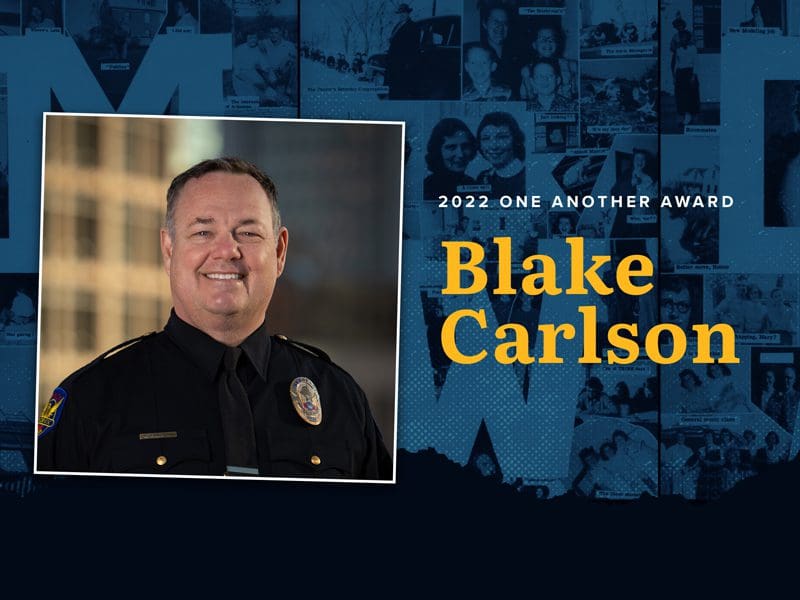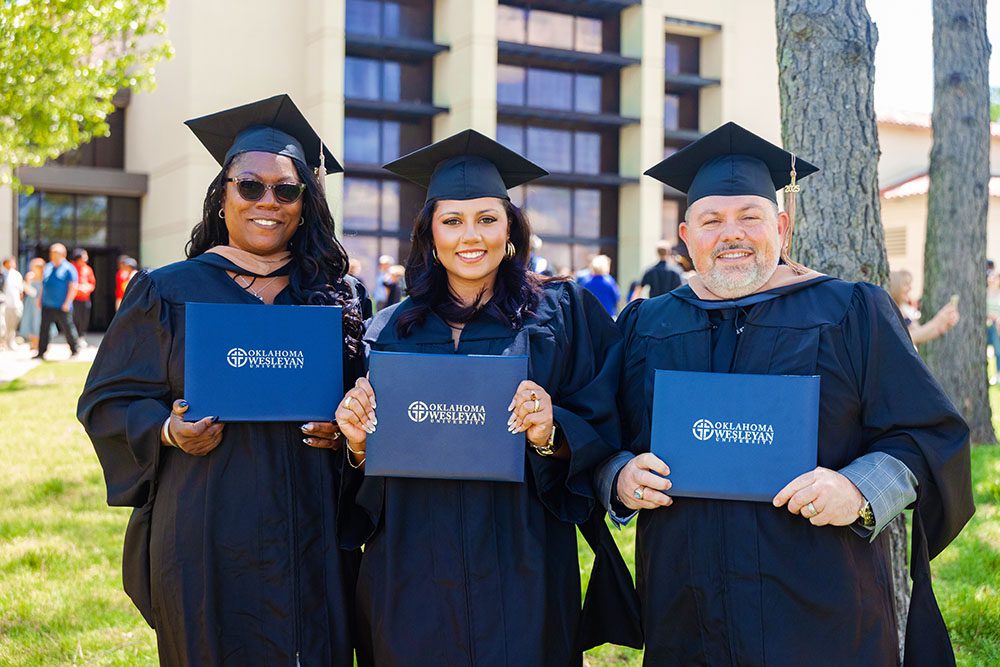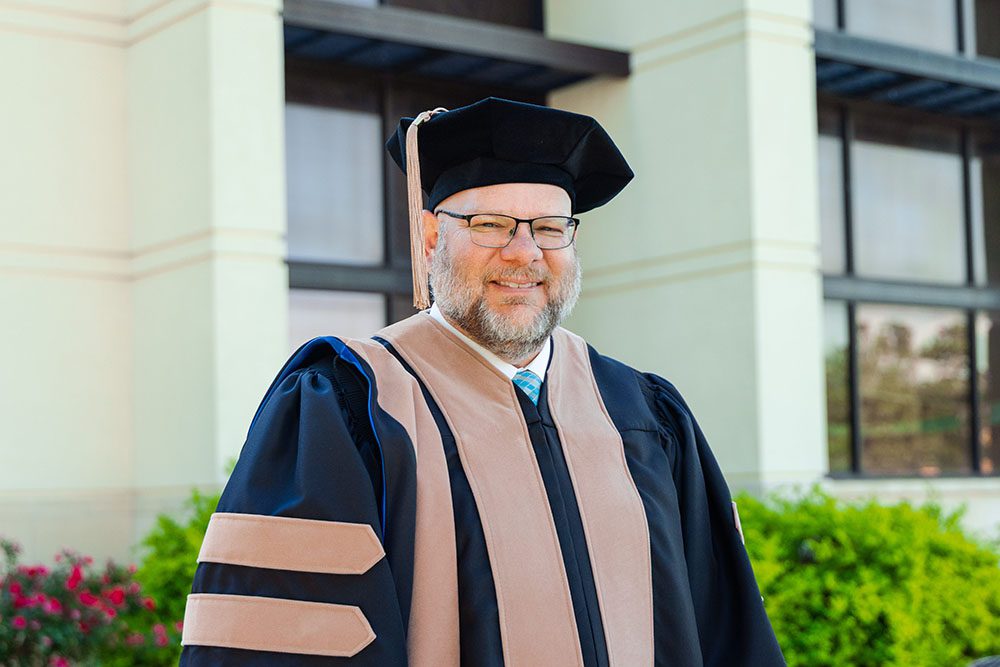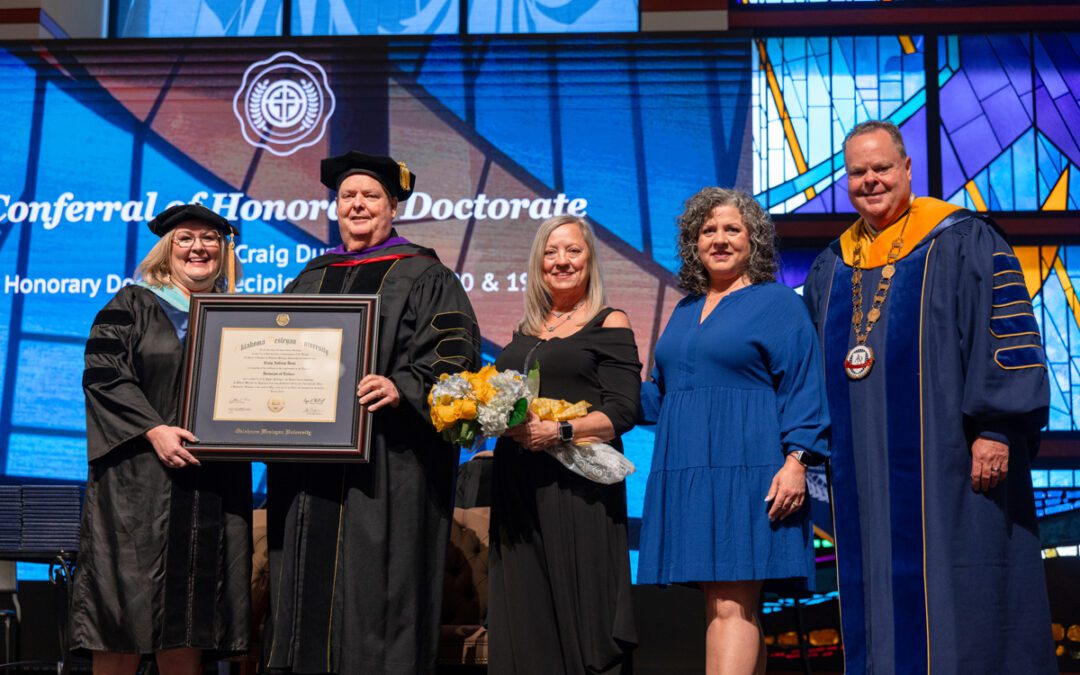In many ways, Blake Carlson (’85)—the 2022 winner of OKWU’s One Another Award—has been on a lifelong search for meaning and excitement. That search has taken him all over the world and put him in some tight spots, but the biggest lesson he’s learned through it all has been counterintuitive: that real excitement comes from being a part of God’s movement.
“I used to think that God’s kingdom was a boring thing to do—that if I really wanted excitement, I’d be working for the government or being a cop or something,” he said. “But now I see that God’s kingdom is where the real excitement is, that God uses everyday people to accomplish his goals. He counters the world’s system, and that’s exactly the mindset I’m coming to now.”
That’s not to say that Carlson hasn’t experienced his fair share of excitement—quite the opposite, in fact. Over a career in law enforcement spanning decades, he’s seen it all: drug raids, undercover operations, top-secret government work, and more. He’s faced tangible threats and safety concerns, but hasn’t spent too much time worried. Why? Because he knows he’s in the midst of God’s unique plan for his life.
And all of that started with a directionless teenager arriving at OKWU’s campus in Bartlesville.
Searching for direction
Like so many students arriving at BWC, Carlson’s ties to the university came through a legacy connection. After being saved as adults, his parents had given their lives to the ministry, working for a brief time as Dean of Students at Miltonvale and eventually pastoring a church for a decade in the Pacific Northwest, where Blake graduated high school. When it came to pick a college—and a course of study—he gravitated toward what he knew.
“Frankly, I didn’t have a lot of direction at Bartlesville,” he recalled. “I didn’t feel as a teen called to the ministry—I just thought that it might be something God would want me to do, but I didn’t have a real burning call.”
He arrived on campus in 1980 without a major. After his sophomore year, he chose Theology, but it still wasn’t an overwhelming passion. In fact, he missed his initial interview time with Dr. Larry Hughes, the meeting in which he was to declare his study.
“I just knew that I had an overpowering sense that I needed to get a degree, and I would be able to work with whatever degree I got,” he said. “My life went on, no matter what I chose to do.”
It wasn’t until after graduating that the first inkling of Carlson’s future plans began to show themselves. Working as a youth pastor in Iowa, he met a couple that volunteered in the church, who also worked for the federal government in a quasi-military capacity. He and the couple felt almost at exact opposite points from each other. “They felt they didn’t enjoy what they did, but their real passion was being youth pastors. Whereas I saw their lives and thought—wow, that’s what I’d really like to be involved in.”
After his time as a youth pastor, Blake moved to Japan, working as an English teacher for four years. It was during this time that he met and married his wife, Michelle. After marrying, they made the decision to return to the United States, leaving Carlson looking for something meaningful to do. He’d taken a few flying lessons during his time as a youth pastor and enjoyed them, so he chose to attend a flying school in the Phoenix area to pursue that full-time. It didn’t last; six months into his training, the school shut down, and Carlson was left, again, to contemplate his future.
It was a chance conversation with a neighbor that set him down his current path. Well, have you thought about being a cop? The idea intrigued Carlson, and after a period of research he enrolled in the police academy in Phoenix, setting off the next 27 years of his life.
a new calling
The training was strenuous, and advancement didn’t happen overnight. “It takes a good year, year and a half to really become halfway competent as a police officer,” he said. “You’re just going from one thing to another, and you become very well-rounded.”
After working as a patrolman for a little over three years, Carlson began dipping his toes into other aspects of policing, aiming to accrue as many different experiences as he could. He worked as an instructor at the police academy, then transitioned to the department’s Employment Services Bureau, working as a detective for potential hires.
It was two years after this posting that Carlson’s break came. He was transitioned to the organized crime unit, pursuing white collar criminals. Specifically, he and his partner pursued the illegal ownership of Phoenix nightclubs, most of which were traced back to drug cartels and which resulted in violence more often than not. They were so successful in these pursuits that they transitioned to the Drug Enforcement Bureau, where Carlson went undercover for long periods of time.
“I had long hair and an earring,” he recalled. “I smoked, hung out in bars a lot, bought drugs… that was my persona. We worked in some dangerous places with dangerous people.”
Despite this element of danger, Carlson remembers his life at this time as surprisingly normal. He received his master’s degree in education, and he and his wife maintained a healthy family dynamic with their two daughters. “My kids had a normal upbringing, and we did things together. We traveled together and took Disney cruises and went to Europe. We made special plans to spend time together.”
There were a few more stops on Carlson’s path to where he currently works—promoting to sergeant, working with a squad that tackled illegal gang parties, working security at Phoenix’s Sky Harbor airport. Six years ago, he moved to the Homeland Defense Bureau, his current role, where he oversees a squad of detectives that work with the federal government, assessing and mitigating threats. Two months of the year, he works in Washington, D.C.; the rest of the year he works in Phoenix.
“We have a very diversified job. We do a lot of threat assessments. Say the mayor or the governor or a congressman get weird emails, we’ll get called and we figure out who’s sending the emails or leaving the voicemail or text message. We determine who they are, and we get a mitigation plan of confronting the people or filing charges against them, whatever’s appropriate. Mostly, we demystify the situation.”
He’s also brought his expertise to bear on behalf of Wesleyan churches, writing a manual in 2018 on church security for small to mid-size churches. “There’s never been a perceived need for security in those churches, but several events in recent history in our country have proven that false,” he said.
All in all, the life Carlson leads now, and the roles that he serves in, are immensely enjoyable. These years, he says, are a culmination of an entire lifetime’s worth of striving, hard work, and uncertainty.
“As I look back, this is exactly what I wanted to be doing, my whole life,” he said. “This is what I’m going to retire as, Lord willing.”
It’s a testament not only to his planning, nor his unique skillset, but to God’s guidance. That, more than anything, is the lesson he takes: God is in control.
“The Lord puts us where we’re good at what we do,” he said. “I have great confidence in God’s ability, even though we can’t see into the future and some of us don’t have clear paths.”



